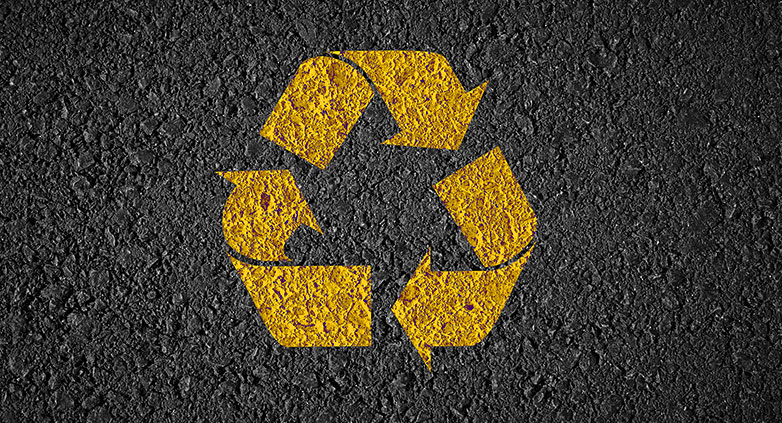Recycled Asphalt Driveways – An Environment Friendly Option
Discover how recycled asphalt driveways offer eco-friendly, cost-effective solutions, transforming 80.3 million tons of asphalt into durable, sustainable surfaces.
Recycled asphalt for driveways is made from reclaimed asphalt pavement, primarily composed of aged asphalt and aggregates. This material is crushed, milled, and sometimes mixed with a small percentage of new asphalt for enhanced binding. It provides a durable, eco-friendly alternative to traditional asphalt, repurposing waste materials while maintaining quality and functionality in driveway construction.
Explore the benefits and process of using recycled asphalt for your driveway, contributing to sustainability while enjoying substantial savings.
How Recycled Asphalt Driveways is Made
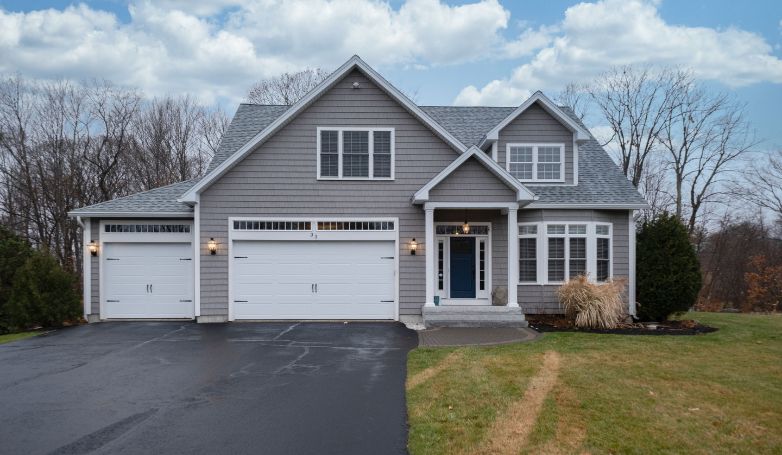
The bulk of recycled asphalt comes from the nation’s roads and highways, but it’s not uncommon to find materials sourced from commercial parking lots or airport runways. This broad sourcing contributes to the environmental benefits of recycled asphalt driveways by repurposing what would otherwise be waste.
Milling Process Explained
- In-Place Milling: This method involves removing existing asphalt in layers, approximately 2 inches thick, using specialized equipment. It’s a popular choice for projects where the recycled asphalt will be reused on-site, such as redoing an existing driveway.
- Full-Depth Removal: More common for larger projects, this method uses a bulldozer equipped with a rhino horn and pneumatic breakers. The asphalt is fully removed, loaded into dump trucks, and transported to milling plants. At these plants, the asphalt is crushed, sifted to remove fine particles, and prepared for reuse.
Quality and Composition of Milled Asphalt
The quality and composition of milled asphalt can vary depending on its source. In some cases, it may need to be mixed with additives to ensure it meets the required standards for reuse. Understanding these variations is crucial for ensuring the durability and longevity of your recycled asphalt driveway.
Application and Finishing Process
Once prepared, the milled asphalt is spread over the driveway area and compressed using either a steam roller or a hand roller. The bitumen within the asphalt acts as a natural binder, helping to compress the loose aggregate into a semi-solid surface. This surface not only closely resembles new asphalt but also hardens over time, ensuring a long-lasting and durable driveway.
Stay tuned as we delve deeper into the process, exploring the technicalities and benefits of choosing a recycled asphalt driveway for your home.
Advantages of recycled asphalt
Recycled asphalt offers a sustainable and eco-friendly alternative to traditional asphalt, presenting numerous advantages that contribute to environmental conservation, cost-effectiveness, and low maintenance requirements.
Ecological Impact
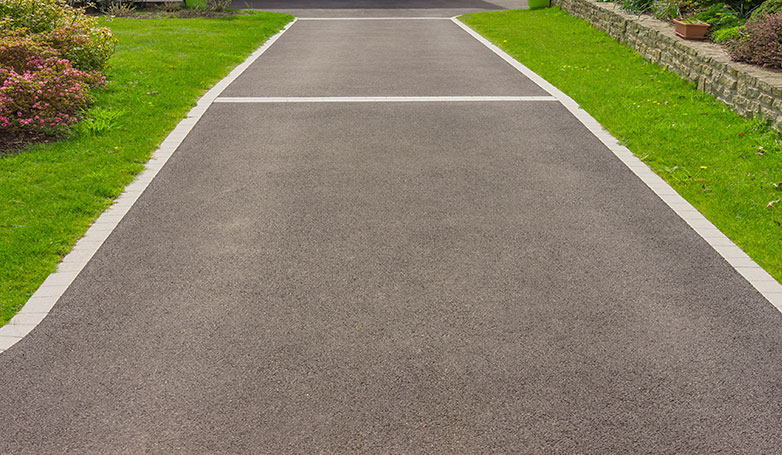
If you decide to go with a recycled asphalt driveway, you’ll definitely get green bragging rights over your neighbors. Neither concrete nor asphalt are sustainable paving choices. New materials require significant energy use, mining and or drilling. On the other hand, recycling asphalt uses only the energy burned by the equipment required to remove it and the milling process. You are also helping prevent old asphalt from being dumped in a landfill where it will not degrade for centuries.
Cost
You’ll also save money with a recycled asphalt driveway. A recycled driveway’s labor cost is similar to a virgin asphalt driveway, but the materials costs are roughly 1/4. Depending on the size of your driveway, this may result in hundreds or even thousands of dollars in savings.
Recycled asphalt is usually sold by the ton. One ton covers about 80 square feet of driveway. The cost of recycled asphalt can vary enormously depending on your geographic area and ranges anywhere from $7/ton to $60/ton. The average driveway is about 600 square feet and would need a little of 7 tons of recycled asphalt.
Low Maintenance
Once your recycled asphalt driveway is in place, you’ll have almost no maintenance. Unlike gravel or oil and stone, asphalt aggregate does not come loose or wash away. You may want to power spray your driveway annually, and that’s about it for maintenance of a recycled asphalt driveway.
Some homeowners may opt to seal their recycled asphalt driveway, in which case the sealant will need replacing every 2 years.
Drains Well
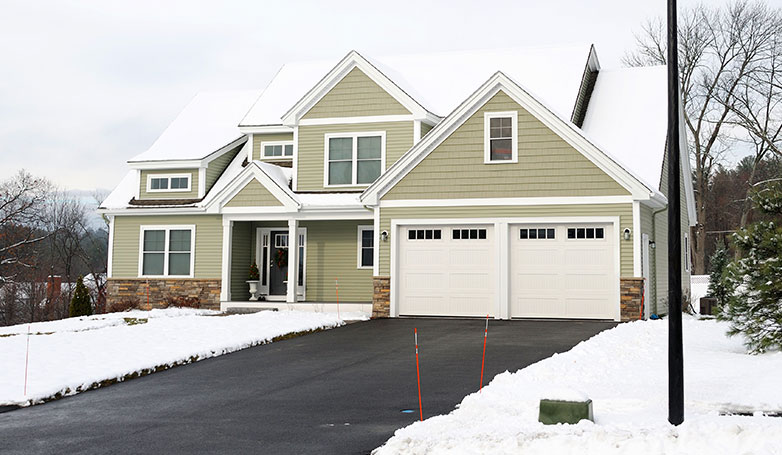
If you live in an area with substantial rainfall or drainage problems, recycled asphalt is a smart choice.
Unlike asphalt or concrete, recycled asphalt is porous. You won’t have to deal with puddles or runoff issues. You also won’t need to connect your driveway drains to the local sewer system, as is often the case with other paving options.
Gets Stronger Over Time
When you first lay down your new recycled asphalt driveway, you may notice it feels a bit soft underfoot. You may also have some loose asphalt kick up on your car’s undercarriage and fender wells.
This is a temporary condition. Each time you use your driveway, your car’s weight further compacts the recycled asphalt, making the asphalt just a little bit stronger each time.
Eventually, the material reaches maximum compaction, and you will have a hard, long-lasting driveway surface.
Durability
Recycled asphalt also results in one of the most durable driveway surfaces. A good quality recycled asphalt driveway will last about 20 – 30 years with minimal maintenance or hassles of any kind. Compare that to gravel (an equally low-maintenance option) with a predicted life of just 10 years. Only concrete driveways last longer but with considerably more annual maintenance. Another plus? When you finally do need to replace your Recycled asphalt driveway, you can recycle it again!
Disadvantages of recycled asphalt
Before you call a paving contractor, there are some downsides of recycled asphalt driveways you should consider.
Aesthetics

If you’ve ever seen an old country backroad paved with recycled asphalt, then you understand the appearance of recycled asphalt.
Recycled asphalt driveways look similar to regular black asphalt but are rough and a bit patchy looking. This can give a more industrial look to a driveway than some homeowners would prefer while missing out on the “sleek” look of virgin asphalt.
Over time, recycled asphalt fades to a nondescript grey color, which is often not an excellent match for many home exteriors and landscaping choices. While it remains just as usable, it may not be as appealing as when it was first completed.
Cracks and Potholes
You must take great care in selecting your contractor when doing a recycled asphalt driveway.
While recycled asphalt has the advantage of becoming harder with time, increased hardness comes with a price. As the asphalt hardens, it becomes more brittle.
If there are any problems with the underlying soil or gravel, those problems are likely to present as cracks or potholes.
Such cracks and potholes are relatively easy to fix. But if you’ve ever noticed the seemly endless presence of road crews repairing potholes on roads made of recycled asphalt, you may already understand that these cracks and potholes do not stay fixed for long.
Consequently, once cracks and potholes appear, you will likely face annual or bi-annual maintenance to keep them from reappearing.
Rutting
Rutting occurs when traffic repeatedly follows the same path, as often seen in residential driveways. This issue is particularly prevalent in hot climates, where the consistency of the asphalt can soften, leading to depressions or grooves forming over time. This not only affects the driveway’s appearance but can also compromise its integrity.
Heave
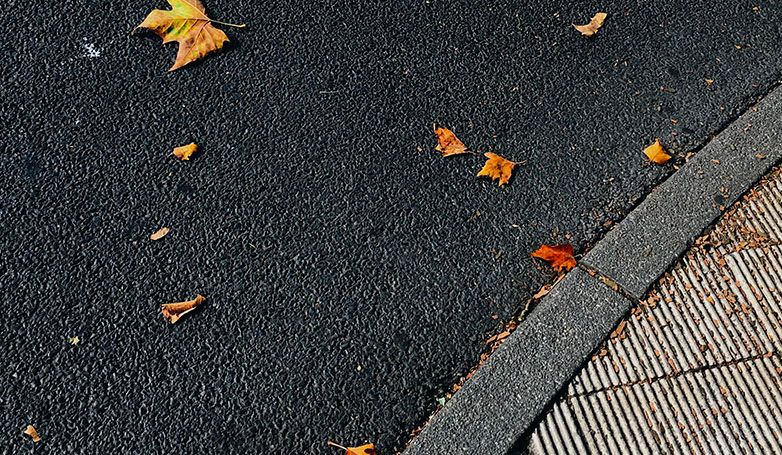
On the flip side, in colder climates, recycled asphalt driveways face a different problem – heaving. These driveways are porous, which can be a double-edged sword. Poor drainage can lead to water accumulation between the driveway surface and its base. In freezing temperatures, this trapped water expands, causing large sections of the asphalt to lift, a process known as heaving. Extensive heaving can be detrimental, potentially requiring a complete driveway replacement.
Pollution
Although recycled asphalt is often touted for its positive environmental impact, there are some caveats to consider.
- Unknown Origins and Potential Pollution: The origins of recycled asphalt are typically unknown, as it’s sourced from various locations without detailed records. This lack of traceability means you could unknowingly introduce pollutants into your property. Contaminants like heavy metals, pesticides, and plastics are possible inclusions in these materials.
- Leaching and Contamination Risks: Over time, recycled asphalt can leach into the ground, potentially affecting nearby landscaping and lawns with contaminants.
- Tracking of Materials: In warmer climates, the looser structure of recycled asphalt may lead to materials sticking to shoes and tires, which then get tracked into homes and garages.
- PAHs and Environmental Impact: Recycled asphalt can contain high levels of polycyclic aromatic hydrocarbons (PAHs), which are targeted pollutants according to the US Environmental Protection Agency. These PAHs can be dislodged from the driveway, contributing to air pollution and contaminating nearby groundwater.
Difficult To Replace
Eventually, your new recycled asphalt driveway will need replacing. With luck and a quality installation, that day may be 20 -30 years in the future. On the other hand, if you experience any of the problems mentioned above, the day of reckoning could be much sooner. Recycled asphalt cannot be paved over using any technology we currently have. This means you are looking at a 100% removal.
That removal process can be messy and release even more potentially hazardous PAHs into your home and the surrounding environment. On the plus side, your removed asphalt will be eligible for milling and recycled yet again.
What to expect when installing a recycled asphalt driveway?
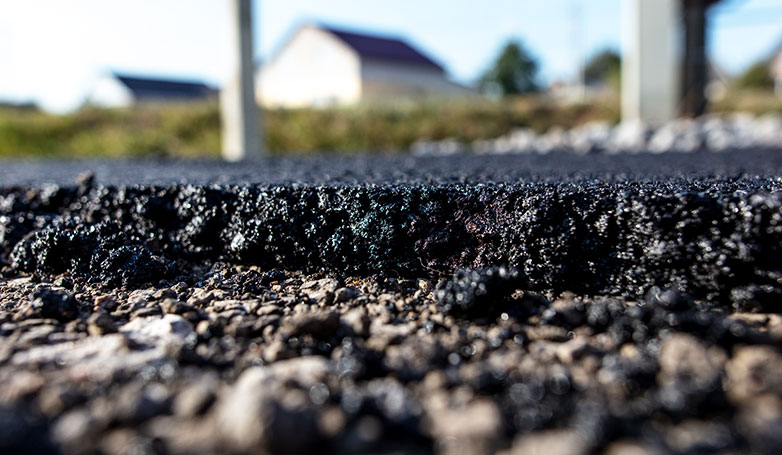
Starting the process of putting in a recycled asphalt driveway is kind of like taking a journey with important steps to make sure everything goes well. You’ll need to figure out local rules, find the right person for the job, and get the base ready. Here’s a look at what goes into making it all happen:
Check your local regulations and community bylaws
Many communities in the United States do not allow either asphalt or recycled asphalt driveways. Check with your local regulators or read your homeowner’s association’s bylaws before proceeding further down this path. Remember, just because your neighbor is doing it doesn’t mean it’s regulatorily approved. Do your homework.
Find a qualified contractor
Theoretically, a recycled asphalt driveway can be a DIY project, but most homeowners opt to hire a pro.
Look for a local contractor who specializes in recycled asphalt driveways or, at a minimum, has a substantial portfolio of work to show you.
Be sure to ask for references from other projects. Again, do your homework and actually talk to the references. If possible, visit the project and see it for yourself.
Talk to the contractor about where they get the recycled asphalt. Are they milling themselves, or are they working with a largescale mill? Large scale asphalt recyclers will have better quality control and produce a more consistent product.
Small-scale milling can be hit or miss.
Of course, price is always a consideration. Be sure to get multiple quotations to ensure you are being treated fairly. Beware of any bid significantly less expensive than the other proposals you receive. A low-ball bid is probably cutting corners or is a sign of inexperience.
Prepare the Bed
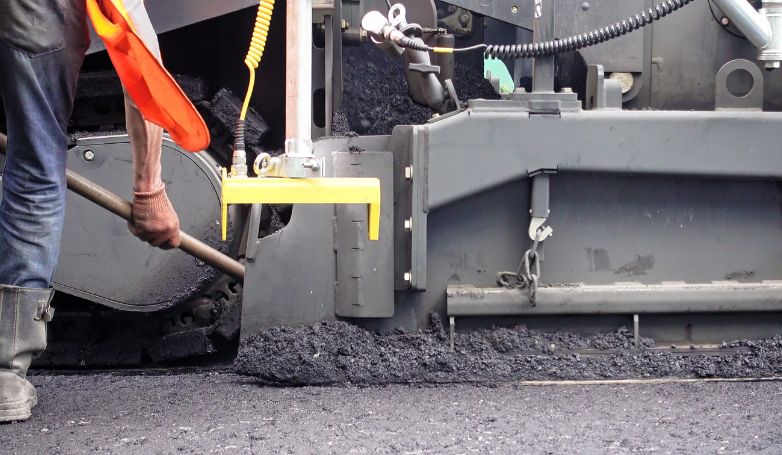
Your contractor will spend anywhere from two days to a week preparing your driveway. They will grade the soil and design drainage. They will then use a roller drum to compact the soil, followed by a loose gravel layer.
Spread the Asphalt Millings
Dump trucks will deliver the asphalt millings to your driveway. Your contractor will spread the milling using a bulldozer or (for smaller projects) by hand.
Expect about a 4-inch layer of milled asphalt. Be sure to inspect yourself to ensure the asphalt is spread evenly, adequately sloped for drainage and precisely edged to accommodate your landscaping.
Compacting
Your contractor will initially compact the recycled asphalt using a 25-ton pneumatic-tired roller. This should be followed by a second compacting using a 12-ton or larger vibrating drum roller. The drums will be kept wet to avoid sticking.
Cure & Seal
Technically, your new drive is ready to use right away; however, in the interest of your car’s paint job. You should wait 1 to 3 days to let the new asphalt cure.
Your contractor may recommend a layer of sealant after curing, depending on local conditions.
For the environmentally-conscious homeowner, a recycled asphalt driveway may be a perfect choice.
- It is greener than most paving options, including asphalt and concrete
- One of the least expensive paving options
- One of the most durable options.
However, they do come with some tradeoffs. The most obvious is they may not be the most aesthetic choice.
As always, do your homework. Your choice of driveway paving is a decision you will live with for literally decades, and you will see the results every time you drive your car up or down the drive!
FAQs about Recycled Asphalt Driveways
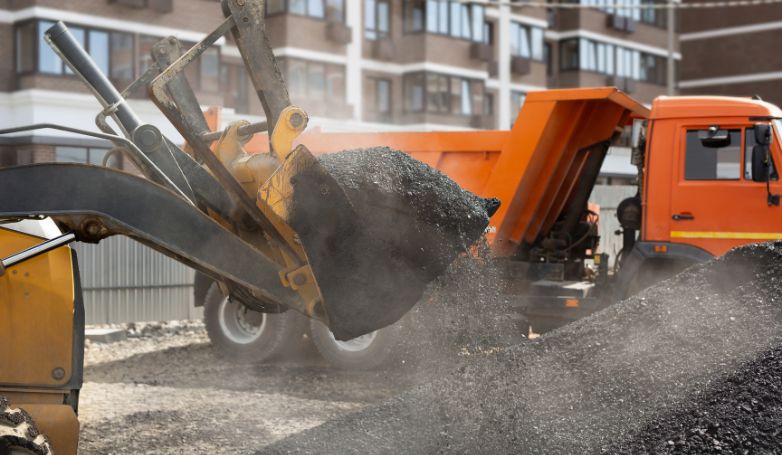
Exploring an eco-friendly and budget-conscious choice for your driveway? Let’s delve into frequently asked questions regarding recycled asphalt driveways to assist you in making a well-informed choice.
Is recycled asphalt good to use on driveway?
Yes, recycled asphalt is a great option for driveways. It’s environmentally friendly, cost-effective, and durable. It offers a stable and robust surface, making it suitable for most residential driveways. Plus, its use contributes to reducing waste, as it repurposes material that would otherwise end up in landfills.
What is the life expectancy of recycled asphalt driveways?
Recycled asphalt driveways can last anywhere between 15 to 20 years, sometimes even longer with proper maintenance. This lifespan is comparable to that of traditional asphalt driveways and is significantly influenced by factors like installation quality, climate, and usage.
Does recycled asphalt go hard?
Yes, over time, recycled asphalt hardens. Initially, it might feel softer, especially in warmer temperatures, but with regular use and exposure to the elements, it compacts and hardens, creating a more solid and durable surface. This process is aided by the weight of vehicles driving over it, which helps to compact the material further.
Is recycled asphalt better than gravel?
Recycled asphalt has several advantages over gravel. It creates a more uniform and stable surface, reduces dust, and is less prone to erosion. Unlike gravel, which can scatter and require regular replenishment, recycled asphalt stays in place better and forms a semi-solid, hard layer. It’s also more comfortable to walk and drive on compared to loose gravel. However, the choice between the two depends on personal preferences, intended use, and budget considerations.
Conclusion
Choosing a recycled asphalt driveway is like giving an old story a new ending. It’s an environmentally kind and wallet-friendly option that turns waste into wonder, providing a sturdy and reliable surface for your home. Yes, they might lack the polished look of new asphalt and require a bit of upkeep, but for those who value sustainability and practical savings, it’s a choice that feels good both underfoot and in the heart. In embracing recycled asphalt, you’re not just paving a driveway; you’re paving the way for a greener future.

